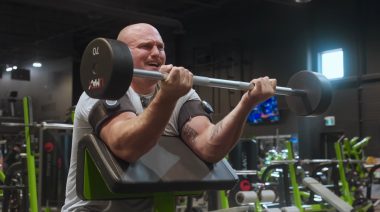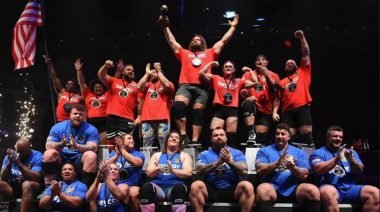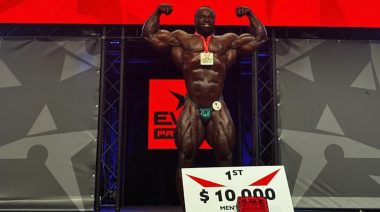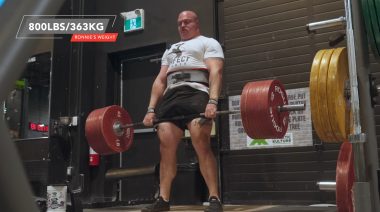Professional bodybuilder Kyle “The Tiger” Kirvay is no stranger to impressive feats of strength. The International Federation of Bodybuilding and Fitness (IFBB) pro and powerlifter recently took to the squat rack and didn’t disappoint. While resting a curved Duffalo barbell on his traps, Kirvay squatted 310.7 kilograms raw (685 pounds) for five reps. According to Kirvay, it was the first time he’s used this type of barbell — he usually lifts with traditional, straight barbells.
I can’t decide if I like it or not or if it makes squatting easier. The weight felt the same to me as a straight bar.
Check out the complete set in the video below, courtesy of Kirvay’s Instagram page. In addition to the curved barbell, Kirvay wore a lifting belt for improved core stability during the set.
View this post on Instagram
[Related: Bodybuilder Breon Ansley Explains His Decision To Retire From The Classic Physique Division]
Kirvay moved through the five reps of the squat set relatively smoothly. Aside from a slightly longer break right before the final rep, Kirvay powered through the entire set while maintaining his form. A quick comment of approval right before the last rep might have hinted that Kirvay appeared to consider the lift notable. He performed each of the reps controlled with deep breaths in between.
Benefits of a Curved Barbell
According to Kirvay’s Instagram post, he says the curved barbell can help lifters who have restricted shoulder movement. His assessment of those potential benefits adds up.
Due to the size of their traps and shoulders, some larger lifters might sometimes lack the required shoulder rotation to properly grip a straight barbell in a narrow fashion. This is important because one study showed that a narrow barbell grip can allow for more weight to be lifted, assist with comfort, and make for an improved range of motion on the squat itself. (1)
Furthermore, the curve of the Duffalo barbell can help larger people with tighter shoulders grip the weight better. In Kirvay’s video — he would qualify as a larger lifter with big shoulders — he appears to take hold of the curved barbell almost by the collars, allowing him to use a narrow barbell grip.
How a Dual-Sport Athlete Might Thrive
Kirvay currently excels in two sports — bodybuilding and powerlifting. His most notable bodybuilding achievement is a 16th-place finish at the 2020 IFBB Chicago Pro. As far as powerlifting, he recently competed in the 2022 USPA Battle at Atilis. There, during his first pro powerlifting meet, he set four New Jersey State Records and a National Record.
It’s impressive that Kirvay can compete at a relatively high level in two sports with such opposing training styles. For example, it can be challenging for a physique athlete to make serious strength gains for powerlifting during a competitive season because of nutritional restrictions. According to one study, bodybuilders’ training while in a caloric deficit often places significant stress on their bodies’ metabolism — especially when they’re trying to build or decrease mass. (2)
However, that doesn’t necessarily mean that someone like Kirvay can’t and shouldnt’t lift heavy. He can still prove capable of lifting astounding amounts of weights amidst a good routine.
View this post on Instagram
High-intensity, low-volume lifting can also act as a quality way to maintain muscle. As some research has stated, high-intensity and low-volume lifting even proved to be more beneficial than a high-volume, low-intensity routine over an extended period. (3) That’s because it can allow for a quality way to stimulate the athlete’s muscles if they don’t have the endurance for more extended sets on a particular day.
An athlete like Kirvay might seek to lower the volume and increase the intensity of their bigger lifts accordingly during the off-season.
Some creativity will likely be necessary to juggle two sports in a highly competitive manner. Whatever Kirvay’s training consists of, he might be thinking outside the box to shine as a bodybuilder and powerlifter.
Kyle Kirvay’s Career and Future
Having only made a recent foray into competitive powerlifting, Kirvay’s ledger of work as a bodybuilder is a little longer. Below you’ll find the results of “The Tiger’s” competitive bodybuilding career to date:
Kyle Kirvay — Bodybuilding Results
- 2017 NPC Steve Stone Metropolitan Championships — Second place — Open Bodybuilding — Men’s Novice Heavyweight — First Place | Open Bodybuilding
- 2017 NPC National Championships — 16th place — Open Bodybuilding
- 2018 NPC Universe Championships — First place — Open Bodybuilding
- 2018 NPC Universe Championships — First place — Classic Physique
- 2020 IFBB Chicago Pro — 16th place | Open Bodybuilding
Here are the results from Kirvay’s powerlifting career to date, which again only includes the 2022 USPA Battle at Atilis:
Kyle Kirvay — 2022 USPA Battle of Atilis | 140 kilograms
- Squat: 365 kilograms (804 pounds) — New Jersey State Record
- Bench Press: 275 kilograms (606 pounds) — National & New Jersey State Records
- Deadlift: 365 kilograms (804 pounds) — New Jersey State Record
- Total: 1,005 kilograms (2,214 pounds) — New Jersey State Record
Whenever Kirvay decides to compete in organized bodybuilding or powerlifting competition again, his squats could prove critical to a quality showing.
References:
- Larsen, S., Kristiansen, E., Helms, E., van den Tillar, R. (2021) Effects of Stance Width and Barbell Placement on Kinematics, Kinetics, and Myoelectric Activity in Back Squats. Front. Sports Act. Living, 2021 Sep.
- Giessing, J., Eichmann, B., Steele, J., Fisher, J. (2016). A comparison of low volume ‘high-intensity training’ and high volume traditional resistance training methods on muscular performance, body composition, and subjective assessments of training. Biol Sport. 2016 Sep; 33(3): 241–249.
- Barakat, C., Pearson, J., Escalante, G., Campbell, B., De Souza, E.O. (2020). Body Recomposition: Can Trained Individuals Build Muscle and Lose Fat at the Same Time? Strength and Conditioning Journal; 2020 Oct; 42 (5): 7-21
Featured image: @kylekirvay on Instagram






